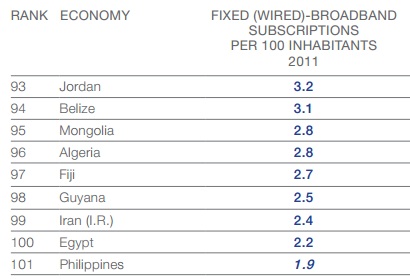Filtered By: Scitech
SciTech
Call-center leader PHL ranks 101st in broadband access
Many Filipinos may be Facebook addicts, but the Philippines remains a digital laggard. A newly released report by a UN-sanctioned commission on the broadband penetration of countries all over the world has put the Philippines at a dismal 101st place, with only 1.9 Filipinos for every 100 inhabitants having access to high-speed Internet connections.

Despite being the call center capital of the world, the Philippines was eclipsed by developing economies such as Mongolia and Guyana. The highest-ranking Southeast Asian country is Singapore, which had a broadband penetration rate of 25.5.
The report, by the UN-sanctioned Broadband Commission on Digital Development, revealed that while household Internet access has seen strong growth over the past year and is on track to achieve the commission’s target for “connecting homes to broadband,” individual Internet use continues to lag.
It warned that "countries that fail to invest in broadband infrastructure risk being excluded from today’s online economy, as well as the next stage of the digital revolution and future
Internet."
Technology analysts believe that mobile broadband could be the platform for accelerating access – at end 2011, there were already almost twice as many mobile broadband subscriptions as fixed broadband connections. Development economists have argued that broadband access has implications for a nation's economic growth. According to a widely quoted World Bank report in 2009, for every 10 percentage-point increase in high-speed Internet connections within a country, there is a corresponding increase in average economic growth of 1.21 and 1.38% for high-income and low/middle-income countries, respectively. Linguistic shift online
The report noted a strong linguistic shift now taking place online. If current growth rates continue, it says, the number of Internet users accessing the Internet predominantly in Chinese will overtake English language users by 2015.
It goes on to outline a variety of ways in which broadband is improving the lives of people around the world, in m-health, distance education and m-learning, via m-payment systems, and in improving the lives of women, promoting innovation, and fostering the acquisition of new skills.
It also reinforces a clear need for policy leadership to facilitate the deployment of broadband around the world. Currently, some 119 countries have a national broadband plan or policy in place.
The Broadband Commission for Digital Development report, issued on Sept. 23 in New York, is the first-ever country-by-country snapshot of the state of broadband deployment worldwide.
The full report can be accessed here. –Newbytes.ph/ GMA News
More Videos
Most Popular




